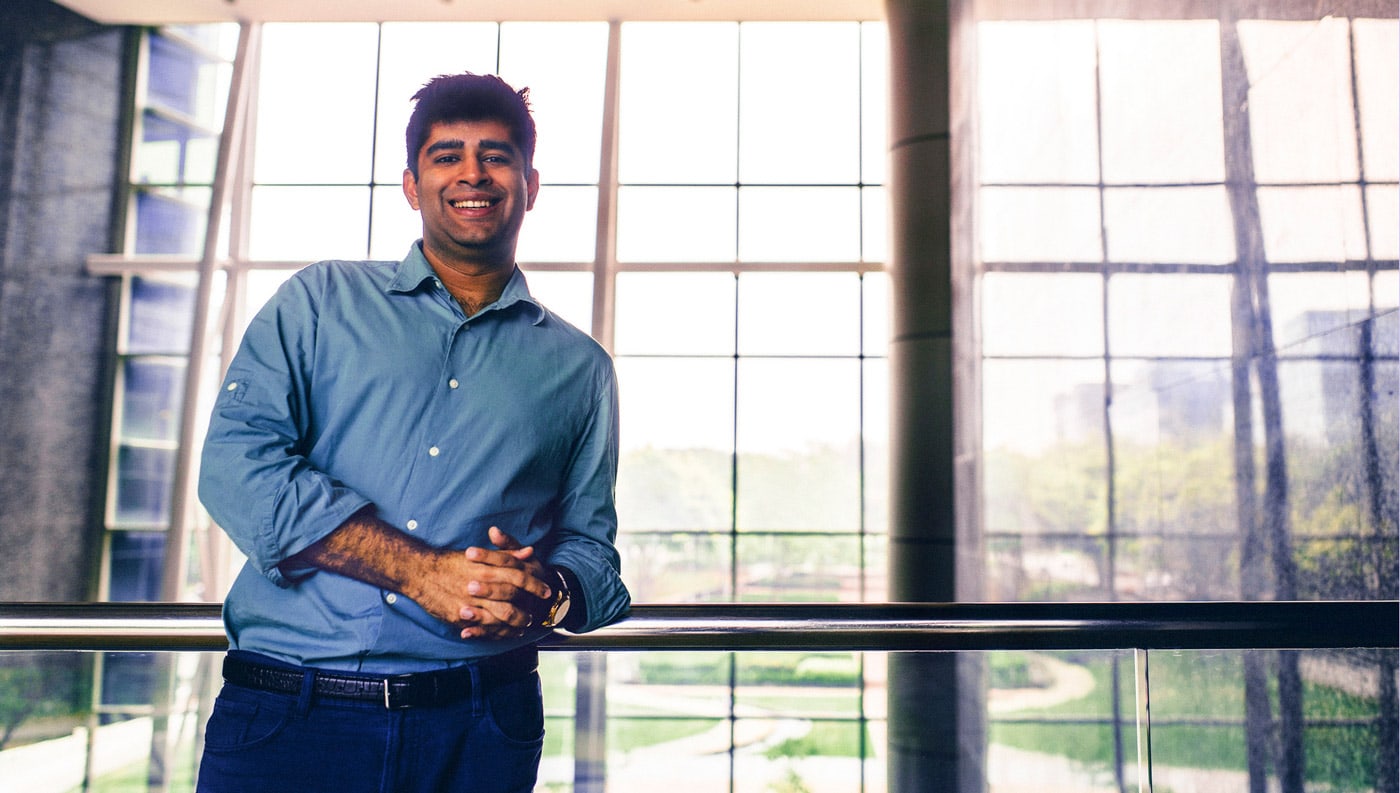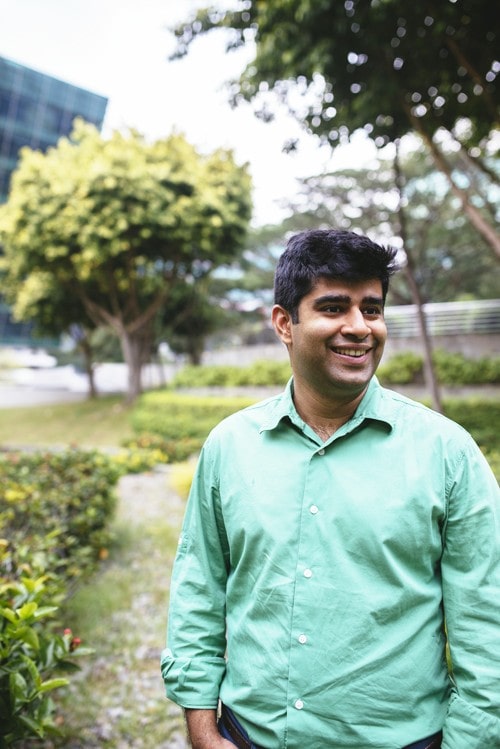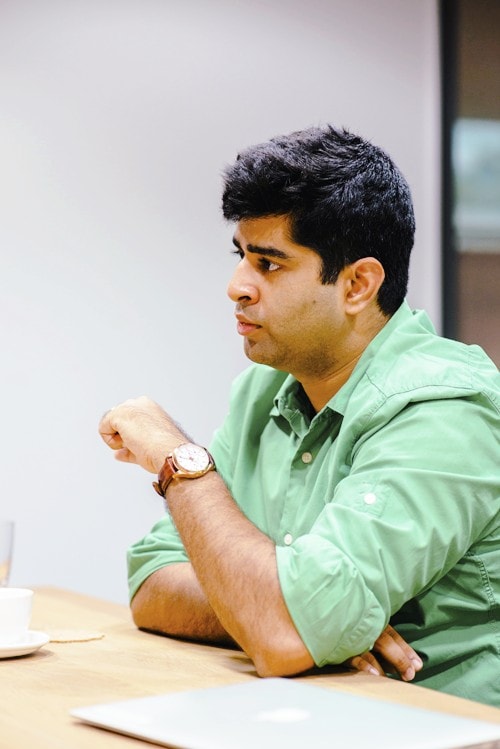Raghav Kapoor: 1 + 1 = 3

Raghav Kapoor values his time – you can feel it as he speaks to you, and he speaks to convince you. Otherwise, he almost sees no purpose in talking. From the operating philosophy of his financial technology start-up, you can glean how he sees the world – the total must be more than the sum of its parts.
Investors are getting a bad deal, he says. In an industry fraught with conflicts of interest and insider privileges, SmartKarma is a fresh take on how an efficient world should look like. In this world, investment research is democratised – and not charged obscene amounts for. Insights will not have value simply because it was a right hunch, but for its long-term value, and contributions in seeding the insights of others.
“We know how broken the model is. Fund managers are bombarded with research, and there’s no good way to assess these reports, let alone rank them”, Raghav asserts. “SmartKarma will rank investment insights by their value-add.” To do this, SmartKarma is providing insight providers with the necessary tools to communicate their ideas.
As regulators continue their onslaught on the banks – the ESMA, for instance, proposed banning paying for research with trading commissions – research departments are becoming less affordable. Indeed, Raghav wants research analysts to use SmartKarma outside the confines of corporations. Data scientists and academics too, who previously had no access to fund managers, can disseminate their ideas and methods via SmartKarma. If app developers can make a living on the app store, investment analysts can too, if the right distribution exists.
“I was just on the phone with this data scientist from Brisbane, Australia, who has developed the world’s first great stress test for US financials. The Feds’ own stress test looks at sixteen factors to do the analysis. He can do 3600 factors, and deliver results for 860 banks in one day,” Raghav says. “Ernst & Young charges 3200 man-hours per bank per stress test.”
This new distribution channel is something Raghav emphasises on. “People like him have no distribution. They’re smart – they’re geniuses. But they’re not good at marketing, at getting discovered. They need someone like us.” After reading Computer Science at Cambridge, Raghav cut his teeth in the financial sector. I ask him why finance, given his technology background. “When I was an undergrad, I was fascinated by numerical analysis. One summer, at Citigroup, I was working on the equity derivatives desk, and I was fascinated by the real-world applications of numerical analysis in the pricing of derivatives. I eventually did my dissertation on option pricing, and some of what I wrote got implemented. Since then, I developed a personal passion for investing.”
Market conditions are now perfect, he proclaims. Heavy-weights agree. Marc Andreessen’s recent piece on Bloomberg said “it’s all about unbundling the banks.” And unbundle the research department SmartKarma will. The fledging start-up has also assembled an impressive list of supporters – three professors sit on their advisory board.
The SmartKarma office is silent – a sure sign people are engrossed in their work, and not talk. The unit, at ‘The Signature’, Changi Business Park, is sparsely populated – 12 people call this place home. “About half are in-house insight providers; the other half is in software and operations.” Most of the team live in the East, says the father of a newborn. I learn that one of them scoots to work, electrically – quintessential tech start-up transport.
YONG HUI YOW: How do you manage your two babies?
RAGHAV KAPOOR: It’s not easy – I’m learning how to. You got to set certain rules, and one of them is between the time I go home, and the time my baby goes to sleep, I don’t check my phone.
YONG HUI: Even if investors are calling.
RAGHAV: Funnily enough, they respect you more because the CEO is a human being, and they also have kids.
YONG HUI: How was your time in finance?
RAGHAV KAPOOR: I was the go-to guy for automating and optimising processes because of my quantitative and technology background. And the time in finance led me to see the glaring problems we’re solving now.
YONG HUI: What is that problem?
RAGHAV: We are focused on two types of investors. The first, are institutional investors, people in the business of managing money. They have two major problems. For many years, they have been dependent on banks and brokers to supply them with research. But increasingly, regulators are changing the rules of that game – you can no longer use trading commissions to pay for research. The second is: inboxes of fund managers are flooded. The typical fund manager receives about 5,000 emails a day – mostly irrelevant. Investment managers are spending more time deleting emails than reading them. The second group of investors is retail. By the time an idea gets to them, usually, it’s too late. Plus, you have no idea why a particular idea was sent to you. Was there a hidden agenda? There are increasingly more conflicts of interests between the bank’s agenda, and what people like you and I want to achieve.
YONG HUI: What do you say to the conflicts of interests between ratings agencies and investors?
RAGHAV: I’ve a cynical answer. Do you know who owns some of these agencies? Warren Buffet owns one of these. There’s a group of investors who says Buffet is not a value investor, but a vulture investor, because when the credit agencies started downgrading those credit default swaps, that’s when he goes in and buys a stake – very opportunistic.
YONG HUI: Who are SmartKarma’s users?
RAGHAV: First of all, expertise is fragmented – it’s a silly assumption to make that only people who work for banks know stuff about investing. People at corporations, independent consultancies – they know a lot too. The problem historically, is that these people had no way to communicate their expertise to the investment community. In addition, because of new regulations, good analysts are leaving the banks, and cannot distribute their expertise anymore. At SmartKarma, we are building a new distribution channel for them, as well as other experts who have never worked at a bank, to very effectively, publish, distribute, and monetise their expertise.
YONG HUI: Who are these guys who have never worked at a bank’s research department?
RAGHAV: It could be the guy who works for GoldenAgri or Wilmar. He looks at palm oil every day, and knows more about palm oil than equity analysts. They may well be better analysts.
YONG HUI: What does SmartKarma do for the retail investor?
RAGHAV: The brokerages make money when people trade, from the commissions, which used to be very high. That’s no longer the case. Now, in order to make the same amount of money, they have to get people to trade more.
YONG HUI: Even if it’s not good for them.
RAGHAV: Exactly. They’re pushing low conviction ideas just to get people to do exactly what they should not be doing.
YONG HUI: What is the right incentive structure?
RAGHAV: The right incentive structure is driven by credibility. We want to bring credibility back to investing. We want to build a system where people work hard to build credibility –come up with good ideas, and help others come up with good ideas. All this is evaluated over time – that’s how you build a credible reputation.
YONG HUI: In this case, do insight providers get paid only if the investor makes money?
RAGHAV: You don’t want to make that deduction, because that has an inherent conflict of interest too. The insight provider gets paid, only if he is adding value to the investor.
YONG HUI: Part of that value could be monetary.
RAGHAV: Exactly. If you come up with a tool that helps investors make better decisions, it will lead to enhanced money-making over time. Similarly, if you’ve made something revolutionary, that investors have no clue about – but other insight providers in your field recognise how good it is, that leads to other people layering on your work, which finally results in happy investors, you have added a lot of value, indirectly. The guy who wrote the kernel for the operating system – people don’t even know his name. However, if he had not written it, you would not have your apps. We want to reward the people who write the ‘operating system’, the people who write the best ‘apps’, and we are letting the platform determine, in real-time, who is adding the most value.
YONG HUI: What if the investor loses money in the short-term, does the insight provider get paid?
RAGHAV: Over time, there will be people who are always wrong. They have value too because they are predictable. Just do the opposite.
YONG HUI: What kinds of insights can providers give?
RAGHAV: Not every insight is a recommendation to buy or sell a security. We did an experiment on our platform when occupy central was going on. One provider wrote a very well thought-out piece on the impact to Hong Kong’s GDP. Other insight providers used his piece to write about the impact to banks, and the property sector. So it can be an analysis too.
YONG HUI: How do you screen insight providers?
RAGHAV: We keep a very high-quality bar – people can’t pretend to be Warren Buffet. We sign contracts with our insight providers. We also have a peer review process to catch any abuse of the system. We try to build enough security gates at the airport to catch the terrorist before he boards the plane.
YONG HUI: Why can’t the banks go directly to the Wilmars to get advice?
RAGHAV: That’s what research teams do. But they’d have no one to do that if they’re gone. They’ll find some cheap, cost-effective labour from India or elsewhere to do that function. These guys have never met the company, or visited the factories.
YONG HUI: They just churn the reports.
RAGHAV: Yes, based on press releases, results filings, annual reports, and everything that’s public. They’re just regurgitating everything that’s public, not adding value.
YONG HUI: It seems this is relevant for investor relations.
RAGHAV: Extremely. In fact, we are building a suite of tools for corporates, to give them a 360 degree view of what their investors are thinking about them. If you’re SMRT, or ComfortDelgro, you should be able to find out what are the top questions, top insights, and sentiments, of your investors. This should be a targeted approach, not carpet-bombing everybody on the mailing list.
YONG HUI: How are you targeting top insight providers?
RAGHAV: We have a really good pipeline of incoming requests to join. Some of these people have been let go by the banks, some have left the banks to set up their own research firms. Others are data scientists.
YONG HUI: Which comes first, the insight providers or investors?
RAGHAV: In our case, it’s the insight providers because there are so many of them.
YONG HUI: What is the tipping point?
RAGHAV: The biggest research team in Asia right now, it’ll either be at UBS or Citigroup – that’s about a hundred people. Once we have about 100 different insight providers, we are already equal in size to the largest institutional research group. We are sourcing for academics, law firms that can comment on the impact of regulations, family offices, and buy-side firms.
YONG HUI: Won’t family offices be biased towards what they own?
RAGHAV: Absolutely not. Some of the best insights come from people who have skin in the game. There’s nothing wrong with that, as long as it’s fairly disclosed.
YONG HUI: How many insight providers do you have so far?
RAGHAV: We want to keep it very small at the start. We have 5 insight providers in-house, and we do that for a reason, to allow others to see how to use the platform. On top of that, we have a pipeline of 75 insight providers.
YONG HUI: Can I think of insights as Tweets?
RAGHAV: Yeah, but not 140 characters. We think the optimal length is about 800 words. We also allow for many types of media – live charts, videos, images. We also provide data widget. So as they start writing, context will be provided to him – they’ll find top tweets, insights from other people on that story, historical data, and upcoming earnings announcements. This will be very useful as he is writing his insight.
YONG HUI: It’s like a writing a blog post, but on steroids.
RAGHAV: Yes, you’re absolutely right. All these incentivise the insight provider to add value to the investor. This will, over time, reduce problems for investors, who don’t have time to sieve through all the data and information. The problem with blogs is a bit like the problem of myspace – it looked so crazy, someone would have pink polka dots, someone would have white stripes. We cannot do that for investments, you need standardisation.
YONG HUI: But research reports today all have different formats.
RAGHAV: Yeah, and you go, ‘where are the financials? Oh, it’s on the first page, no, it’s on the third page.’ This is not helping the investor.
YONG HUI: How much will SmartKarma cost investors?
RAGHAV: We are doing studies on this, so we are not anchoring ourselves. Today, an institutional investor would pay at lowest, US$250,000 for research. And they’d have relationships with 8 or 10 banks, so they spend millions. A big fund like Fidelity would pay hundreds of millions. We want to disrupt that, and crush the cost curve.
YONG HUI: Why is Bloomberg not doing this?
RAGHAV: Bloomberg is our biggest competitor. The reason they’re not doing this is two-fold. They’re like an elephant in a small room. Every time they move a little bit, they break something. The biggest customers of Bloomberg are the banks. If they start providing a research distribution service, they’d cannibalise their own client-base. The second problem is they’re being disrupted themselves. Bloomberg’s most powerful product is their instant messenger that people in finance use. A year ago, it was discovered they were misusing it, and reading people’s messages, finding out about deals before they happened. So some big banks, led by Goldman Sachs stopped using Bloomberg. These fourteens banks then invested in a company called ‘Symphony’, an alternative to the Bloomberg Messenger. Bloomberg has got big fires – banks are no longer happy paying them millions of dollars.
YONG HUI: It seems an even bigger conflict of interest that the banks own stakes in this instant messaging service.
RAGHAV: That’s why they have made it open-sourced. But this is a great line of thought. Think about it: What symphony is to the banks, SmartKarma can be for the asset management firms.
YONG HUI: You’re not the new Bloomberg then.
RAGHAV: Why recreate your competition – we are altogether different. We want to be a credible alternative to big bank research, through collaborative insight. I’m very fortunate that some of my team had left high-paying jobs, and have come together in a mission-minded way to build what they think will be a world-class company.



